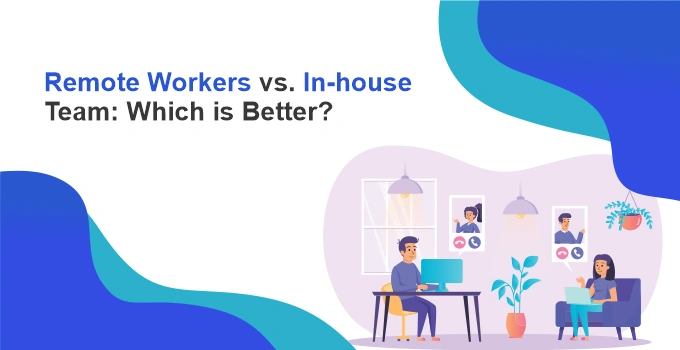Remote Workers vs. In-house Team: Which is Better?
Remote workers or in-house team? It’s a decision that all businesses have to make. There are a lot of factors to take into consideration when you’re deciding whether or not to start your own business. You will, of course, need to add up how much all of your expenses are, and then subtract how much you’ll receive in cash from it.
What exactly do remote developers bring to your company? Is it worth giving up on an in-house team for a few more bucks? To find out, we will examine the pros and cons of each arrangement using a practical example from one of our clients to compare remote workers vs. in-house team.
In-House Team
An in-house team is a set of employees that work together to achieve a specific goal. This could be improving a product, creating a new strategy, or working with an outside partner to help its business grow. By creating this type of collaboration, companies can generate new ideas and test out new solutions faster than if they were employing a contractor or a software service.
The in-house team model is revolutionizing how organizations run and work. It has several advantages over traditional hiring practices. It can give you more power and independence in hiring. It can give you more flexibility in setting the course of the organization’s work. In-house teams can help to relieve outsourcing pressure and enable you to choose how to prioritize work.
Advantages of In-House Team
- In-House teams have a greater likelihood of causing security breaches
- Speed and Freedom
- Customization is simpler
- Turnaround times are shorter
- Early flexibility in case of any change
- Direct control of the production process
- Control over the product pivot and strategy
- In-house teams deliver higher quality work
- In-house teams are better for managing the steady development of employees` skills
- It saves you money from not going with an outside agency
- Easy liquidity of equity as you can sell internal shares in your company on its own merits without having to compete
- Focused and dedicated resources
Disadvantages of In-House Team
- Lack of objectivity in the evaluation
- Conflict of interest with staff appraisals
- Impatience with the management learning curve
- Additional cost: you need to hire labor and paying for their salaries
- It does not allow cross-functional participation
- Lose time and resources training new employees
Click here to read: Work from home: a professional guide to the tools you need to work remotely
Remote Workers
The remote team model is a type of business model in which some IT, development, or other work is done outside the company premises. In some cases, companies may want to hire individual developers. In other cases, enterprises may want to hire an entire dedicated team. Employees outside the local area can be hired for relatively cheap, and as a result, clients don’t have to worry about paying for expensive overhead costs.
Most clients prefer an outsourcing model where they can see the project’s progress and the amount of work that’s already been done, but other models give you benefits.
Remote workers’ benefits are much greater than those of regular employees because companies can use the expertise of remote workers worldwide, placing them in positions where they can best contribute. It might be difficult for huge companies to make these kinds of changes, but small businesses can often adopt new strategies and methods for increasing efficiency.
Advantages of Remote Workers
- Higher productivity
- Save on space and expenses
- Larger work-space and better hours
- Remote workers are more likely to cooperate
- They are more likely to communicate effectively because they can’t work with others in the same room
- Remote workers don’t have to worry about distractions at the office, which can include a lot of things, including the need to wear formal attire and socialize with co-workers
- Consider the diversity of talent you can access when outsourcing to a remote team
Remote employees are free to work whenever they want, but they have to work with the same amount of effort and quality as if they were working at the target time given by their employer. In addition to saving money, outsourcing to a remote team also gives employers the freedom to hire only the people they need, without abiding by the traditional office hierarchy.
Disadvantages of Remote Workers
- Working with remote team workers across time zones can cause a disconnect between departments that can lead to confusion
- Many freelance workers are self-employed and do not carry the company’s anonymous risks, like the risk of bad loans, poor cash flows, and bad reputations.
Click here to read: 20 Winning Lead Generation Strategies for 2024
Conclusion
If you’re doing a long-term project, you are looking to hire the best prospects, and you have an office, it can be hard to find those on the same continent as you. You can find the right candidates on your own, but if you choose to use a staffing agency, be sure to choose one that will manage the recruiting process for you. The great news is that you can now get access to a Rolodex of talent without having to worry about administrative hassles.



